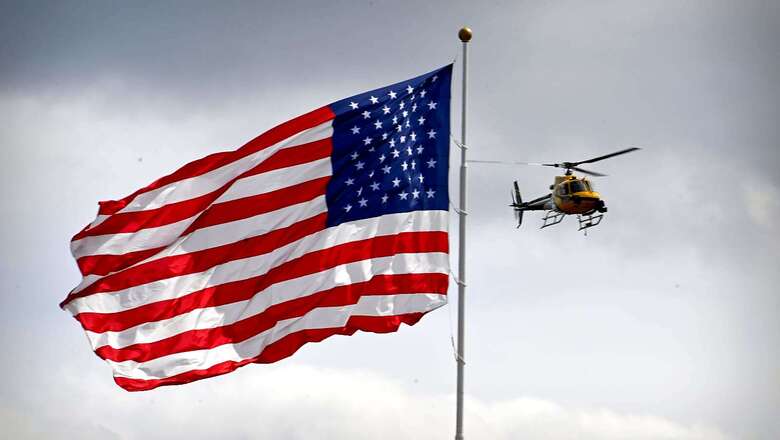
views
In a moment of rare candour, President Joe Biden had remarked recently that Pakistan “may be one of the most dangerous nations in the world”. In 2018 former President Donald Trump had accused Pakistan of taking “more than $33 billion in aid” and giving back “nothing but lies and deceit” as also providing “safe haven to the terrorists we hunt in Afghanistan”. Even so Washington continues to be enamoured of Islamabad, particularly its military brass.
This dalliance with dictators and extremists is a trait common to many Western nations. Simultaneously they have appointed themselves as the guardians of the so-called rule-based international order, democracy, human rights, and civil liberties. Yet there is a catch. They often do not practice what they preach, especially when it does not serve their interests.
They funded and trained Islamist fundamentalists (Mujaheddin in Pakistan /Afghanistan during Soviet occupation), engaged in war of choice proffering flimsy evidence (Iraq) which caused tremendous death and destruction, cultivated totalitarian leaders and military dictators (Mao, Zia-ul-Haq, Ferdinand Marcos) and washed their hands off millions of hapless and vulnerable civilians — women, children and minorities (Afghanistan). Yet, they have never been held accountable.
However, they have no hesitation about passing judgement on others, particularly developing societies because they are easy to pick on. Is it any surprise therefore that rarely, if ever, a developed nation or its leader has faced trial in the International Court of Justice or been hauled before the human rights council? This “special” treatment is reserved for Third World nations.
And when for a change, at the behest of the Philippines, the Permanent Court of Arbitration ruled in 2016 that the Chinese nine-dash line and claims over features in the South China Sea were invalid, Beijing just shrugged it off. Moral of the story: The rich and the powerful can do nothing wrong — only the not-so-empowered are guilty.
India has been at the receiving end of the West’s manipulative politics, before, during and after Independence. As if two centuries of exploitation and draining of India’s riches were not bad enough, the British planted the seeds of enduring contention between India and Pakistan by partitioning the country in a hasty and ham-handed manner.
Sir Cyril Radcliffe, a British lawyer, was given just five weeks to carve out India. He had never been to the country, had little knowledge of India’s geography or demography, but wielded tremendous authority. In an interview with an Indian journalist, he disclosed that he “had almost given Lahore to India but was then told how Pakistan would be left without any major city” (The Indian Express). The ensuing chaos and massacre left hundreds of thousands dead. The Indian state of Jammu and Kashmir has barely seen peace ever since.
British ‘benevolence’ did not end here. Recalls former Foreign Secretary MK Rasgotra, it was “Britain that way back in 1949 managed to muddy India US relations. The American stance at the United Nations Security Council on the Kashmir issue initially was quite favourable. But under British instigation, who were hostile on the issue and generally very hostile towards India”, they changed track.
Similarly, notwithstanding strained ties, after the 1962 conflict with China, “the Americans came to our help. For two years they helped us with arms, ammunition, intelligence and more. But once again under Pakistani and British pressure the aid ceased. British anxiety was that India should not become so strong that it would launch a campaign to push China out of northern Ladakh. It was a strange kind of logic for a country that professed friendship”.
British colonial hangover and the propensity to play all sides has barely diminished even after 75 years of India’s Independence. If they can have their way, they would restore the hyphenation between India and Pakistan. The British are the happiest when fishing in troubled waters. They were at their patronising best after the 26/11 bloodshed in Mumbai by Pakistani terrorists.
India got yet another taste of British doublespeak in August 2019 when Article 370 of the Constitution was amended to scrap the special status of Jammu and Kashmir. Incensed, Pakistan requested its patron-friend China, a P5 member of UNSC, to hold an open discussion on the Kashmir issue at the Security Council.
This was promptly rebuffed by the US, France and Russia. But the UK quietly went along with China even seconding its proposal for the adoption of some form of outcome statement. For good measure they also assured India of their support. The moment the matter became public, a British government functionary stated “I can confirm we did not take sides in the debate [within the UN Security Council] and did not side with China against India.” No one was amused as the clarification rang hollow.
Britain has looked the other way, time and again, when Khalistani, Kashmiri or other disruptors, have staged violent demonstrations in front of the Indian High Commission in London. The country has become a haven for Indian fugitive economic offenders. Why? Because of their ill-gotten wealth! As such it may not be wrong to say that Britain is one of India’s most dangerous friends.
India has been dealing with Pakistan-inspired terrorism for over four decades. The brunt has been borne by Punjab and Jammu and Kashmir. Hundreds of innocent lives have been lost without eliciting any reaction from the West. However, when India acts against the terrorists some of our affluent friends express contrived concern.
The External Affairs Minister of India did some straight talking in Washington last month. “There is a big song and dance about the Internet being cut… (in parts of Jammu & Kashmir). Now, if you’ve reached the stage where you say an Internet cut is more dangerous than the loss of human lives, then what can I say?” ‘Shocked’ by the death of Abu Bakr al-Baghdadi, head of the murderous Islamic State, the Washington Post mourned him as an “austere religious scholar”. The BBC can only bring itself around to describe perpetrators of terror in developing countries as ‘militants’.
That said there is a much better understanding in the Western world about the Kashmir issue and acceptance that it should be resolved bilaterally between India and Pakistan. Even so some politicians find it difficult to resist the temptation of weighing in. The other day Green Party co-leader Annalena Baerbock and Foreign Minister of Germany suddenly discovered “a role and responsibility with regard to the situation of Kashmir”.
India’s ministry of external affairs reminded that “serious and conscientious members of the global community have a role and responsibility to call out international terrorism — when states do not recognise such dangers, they also do grave injustice to the victims of terrorism”.
Then again earlier this month the US ambassador to Pakistan on a visit to Pakistan-occupied Kashmir (POK) repeatedly called it AJK (Azad Jammu and Kashmir). This is when “India-US relations are probably at their best in the last 75 years since Independence” according to former NSA Shivshankar Menon. In a reversal of policy, Washington has also decided to provide F16 sustenance kits to Pakistan supposedly for counter terrorism purposes. It is well known that Pakistan has been using American weaponry against India.
As they say, there is only a fine line between genius and madness as both share a particular gene. Similarly, there is a fine line between friend and foe when it comes to international relations. Yesterday’s allies turn hostile, and opponents become compatriots. Today’s diplomacy needs to operate at different levels even with the same partner-nation or adversary, to safeguard national interests. Speaking at Kargil on Diwali day Prime Minister Narendra Modi hit the nail on the head: “The country is safe only when the borders are secure, the economy is strong and the society is full of confidence.”
The author is Former Envoy to South Korea and Canada and Official Spokesperson to the Ministry of External Affairs. The views expressed in this article are those of the author and do not represent the stand of this publication.
Read all the Latest Opinions here



















Comments
0 comment